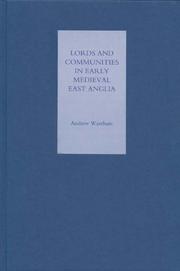| Listing 1 - 3 of 3 |
Sort by
|

ISBN: 1282080873 9786612080876 1846154103 1843831554 Year: 2005 Publisher: Woodbridge : Boydell Press,
Abstract | Keywords | Export | Availability | Bookmark
 Loading...
Loading...Choose an application
- Reference Manager
- EndNote
- RefWorks (Direct export to RefWorks)
This text is an investigation of the changing power structures of the English aristocracy in medieval England. The author uses the organization of the aristocracy in East Anglia as a case study to explore the issue.
Nobility --- Human ecology --- Social ecology --- Social groups --- Cities and towns, Medieval --- History --- East Anglia (England) --- Politics and government --- Medieval cities and towns --- Association --- Group dynamics --- Groups, Social --- Associations, institutions, etc. --- Social participation --- Ecology, Social --- Environment, Human --- Human ecology (Social sciences) --- Human environment --- Social sciences --- Ecology --- Human beings --- Ecological engineering --- Human geography --- Nature --- Noble class --- Noble families --- Nobles (Social class) --- Peerage --- Upper class --- Aristocracy (Social class) --- Titles of honor and nobility --- Social aspects --- Effect of environment on --- Effect of human beings on --- East Anglia. --- European aristocracy. --- Kinship ties. --- Local power. --- Social mobility. --- Social structure
Book
ISBN: 147985963X 9781479817283 1479817287 9781479859634 9781479823277 1479823279 Year: 2020 Publisher: New York
Abstract | Keywords | Export | Availability | Bookmark
 Loading...
Loading...Choose an application
- Reference Manager
- EndNote
- RefWorks (Direct export to RefWorks)
"'A Pledge with Purpose' explores Black sororities and fraternities and the role(s) that they play in the fight for equality."--
African American Greek letter societies --- History --- United States. --- American Council on Human Rights. --- Great Depression. --- Harlem Renaissance. --- Jim Crow. --- New Deal. --- Politics. --- The Nadir. --- World War I. --- World War II. --- academic achievement. --- activism. --- black church. --- brotherhood and sisterhood. --- civil rights. --- colleges and universities. --- community service. --- cultural heritage. --- cultural production. --- desegregation. --- discrimination. --- education. --- employment opportunities. --- exclusion. --- federal initiatives. --- health and wellness. --- housing. --- kinship ties. --- labor. --- legislation. --- literacy. --- literary societies. --- lobbying. --- lynching. --- organizational commitment. --- organizations. --- organizing. --- philanthropy. --- protests. --- public policy. --- race and ethnicity. --- race consciousness. --- racial identification. --- segregation. --- social action. --- social movements. --- social uplift. --- voting. --- “Divine Nine”.
Book
ISBN: 178744290X 1847011829 Year: 2018 Publisher: Suffolk : Boydell & Brewer,
Abstract | Keywords | Export | Availability | Bookmark
 Loading...
Loading...Choose an application
- Reference Manager
- EndNote
- RefWorks (Direct export to RefWorks)
Between the two World Wars, the radical innovations of African Catholic and Protestant evangelists repurposed Christianity to challenge local and foreign governments operating in the French-administered League of Nations Mandate of Cameroon. Walker-Said explores how African believers transformed foreign missionary societies into profoundly local religious institutions with indigenous ecclesiastical hierarchies and devotional social and charitable networks, devising novel authority structures to control resources and govern cultural and social life. She analyses how African Christian religious leaders transformed social and labour relations, contesting forced labour and authoritarian decentralized governance as threats to family stability and community integrity. Inspired by Catholic and Protestant doctrines on conjugal complementarity and social equilibrium, as well as by local spiritual and charismatic movements, African Christians re-evaluated and renovated family and community authority structures to address the devastating changes colonialism wrought in the private sphere. The history of these reform-minded believers reveals how family intimacies and kinship ties constituted the force of community resistance to oppression and also demonstrates the relevance of faith in the midst of a tumultuous series of forces arising out of the colonial situation peculiar to Cameroon. Charlotte Walker-Said is Assistant Professor, Department of Africana Studies, John Jay College, City University of New York (CUNY).
Christianity and culture --- Religion and sociology --- Religion and society --- Religious sociology --- Society and religion --- Sociology, Religious --- Sociology and religion --- Sociology of religion --- Sociology --- Contextualization (Christian theology) --- Culture and Christianity --- Inculturation (Christian theology) --- Indigenization (Christian theology) --- Culture --- History --- Cameroon --- Cameron --- Camerun --- Camerŵn --- Federal Republic of Cameroon --- Gweriniaeth Camerŵn --- Jumhūrīyah al-Kāmīrūn --- Kamailong --- Kameroen --- Kameron --- Kameroun --- Kamerun (Republic) --- Kamerunská republika --- Kāmīrūn --- Republic of Cameroon --- Republica de Camerún --- Rèpublica du Cameron --- Republiek van Kameroen --- Republik Kameroun --- Republik Kamerun --- Republika Kamerun --- République du Cameroun --- République fédérale du Cameroun --- République unie du Cameroun --- Rėspublika Kamerun --- State of Cameroon --- United Republic of Cameroon --- Рэспубліка Камерун --- Република Камерун --- Камерун (Republic) --- جمهورية الكاميرون --- كاميرون --- 喀麦隆 --- Cameroun --- Kamerun --- Religion --- Religious life and customs --- Social conditions --- Colonization --- 1900-1999 --- African Catholic. --- Africana Religions. --- Africana Studies. --- Charlotte Walker-Said. --- Christian Conversion. --- Christianity. --- City University of New York. --- Colonial Situation. --- Colonialism. --- Community Integrity. --- Community Resistance. --- Conjugal Complementarity. --- Cultural Transformation. --- Devotional Networks. --- Faith, Power and Family: Christianity and Social Change in French Cameroon. --- Faith. --- Family Intimacies. --- Family Stability. --- Family. --- French Cameroon. --- History. --- Indigenous Ecclesiastical Hierarchies. --- Indigenous Religion. --- John Jay College. --- Kinship Ties. --- Power. --- Protestant Evangelists. --- Religious Leaders. --- Religious Transformations. --- Social Change. --- Social and Charitable Networks.
| Listing 1 - 3 of 3 |
Sort by
|

 Search
Search Feedback
Feedback About UniCat
About UniCat  Help
Help News
News